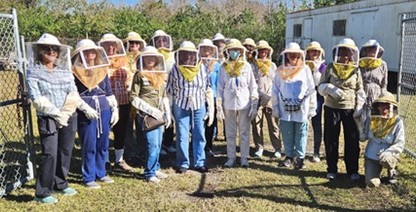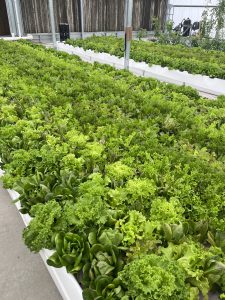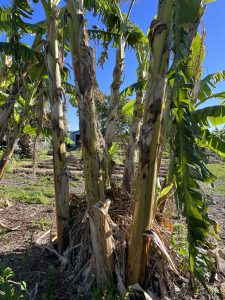By Rebekah Heppner, Pinellas County Master Gardener Volunteer
The Pinellas Master gardeners visited the Pinellas Beekeepers site at St. Pete College Apiary recently. It was a truly unique experience to actually hold those worker bees in my hands. I’ve been feeding the bees with native plants in my garden for years but had never been so close to them.

During that same February week, I visited three farms within 20 miles of my home in St. Pete. No, I’m not talking about the recent Sustainable Urban Agriculture Coalition’s Pinellas Urban Garden and Farm Tour weekend. I had visitors from up north then and couldn’t convince them it was a tourist thing. So, I put together my own farm tour, with the help of a few friends and fellow gardeners.
Elise Pickett of Urban Harvest in St. Petersburg opened her yard to small groups on a Saturday to share with us what can be done on a St. Pete sized lot. Her family is self-sufficient for greens right out of her front yard. Although she is gardening mostly in raised beds now, she is employing sheet composting in the rest of the yard, slowly turning her sandy Florida yard into rich garden soil. Why aren’t we all doing that?

Fat Beet Farm is a family business just across the Hillsborough County line on Tampa Road that offers public tours for a small price. There is lots of info online about their interesting sustainable initiatives. In only six years they turned a swampy lot near salt water into a producing farm that supplies both their onsite café and an affiliated restaurant. The property includes a large aquaponic greenhouse full of beautiful leafy greens and the beginnings of a food forest as well as vegetables growing in beds built up from the soil line by the addition of mulch and organic material. The gardens are fed with slurry from their very own biodigester. All the food waste from their kitchen, as well as any plant waste, is fed into a grinder and turned into a rich liquid fertilize in the biodigester in less about 24 hours. Super-speedy composting!

Eckerd College students started their community farm on campus as an informal volunteer project but there are now classes and clubs utilizing the space and an onsite faculty member, former Pinellas Extension staff member Jonathan Prieto, now known as Farmer John. There is a tea garden maintained by the Ethnobot N’Tea Club and a rapidly growing food forest. Their compost piles each have a name and a QR code that any student worker can scan to see when the pile was last turned, what its temperature record is and when it was watered. I was not terribly surprised to see these digital natives gardening with their cell phones.
All three farms are growing bananas, papayas and pigeon pea, Cajanus cajan. I had never seen pigeon pea, a perennial shrub with lovely yellow flowers the bees seem to like. The flowers are followed by seed pods that are edible both when green and after being allowed to dry. I’m hoping to find a source for this and add it to my own edibles garden soon.
 2
2
